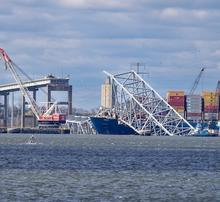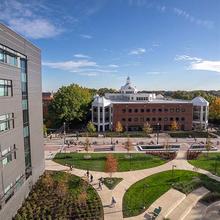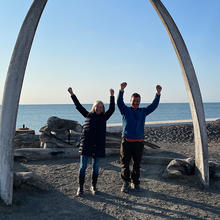- October 22, 2025
The Sustainable Geo Infrastructure (SGI) group takes their work beyond the laboratory and into the real world...all the way to a road near (or under) you.
- October 7, 2025
Researchers at George Mason University will collaborate on an NSF planning grant to develop resilience solutions and technologies. They will work with Indigenous communities, industry partners, government agencies, and six academic institutions.
- October 16, 2024
It was a day that residents in the Washington, D.C.-Baltimore metropolitan areas won’t soon forget: March 26, 2024, when the Baltimore Francis Scott Key Bridge collapsed, killing six and leaving many more forever impacted. Since then, George Mason University professors Elise Miller-Hooks, Alireza Ermagun, and Shanjiang Zhu have received two NSF RAPID grants to study the cause and impact of the collapse, and potential preventative methods for the future.
- April 29, 2024
Kirin Emlet Furst, in Mason's Department of Civil, Environmental, and Infrastructure Engineering, is using funds from an NSF CAREER award to measure the amounts of harmful "forever" chemicals in drinking water.
- January 23, 2024
Mason scientists and partners will leverage their climate expertise and the university’s resources into broader societal implications, thanks to a $6 million grant from the National Science Foundation (NSF).
- August 23, 2023
The National Science Foundation's Navigating the New Arctic researchers traveled to a remote location to attend the Permafrost and Infrastructure Symposium in Utqiaġvik, Alaska, some 320 miles north of the Arctic Circle.
- November 16, 2021
Using virtual reality (VR) and artificial intelligence (AI), a team of researchers at George Mason University is taking a wrecking ball to barriers faced by neurodiverse individuals in construction.
- November 11, 2021
The National Science Foundation (NSF)’s I-Corps program is an accelerator that helps entrepreneurs and researchers work together “to bring invention to impact.” Mason serves as an official I-Corps site, supporting local grantees through the exploratory stages of venture-building, as well as preparing them to apply for the national-level program.
Since the start of the coronavirus pandemic, the National Science Foundation has awarded more than 800 Rapid Response Research (RAPID) grants designed to get researchers into the field and lab quicker than the traditional grant process.








